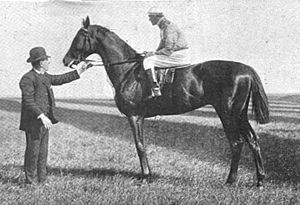Cicero (horse) facts for kids
Quick facts for kids Cicero |
|
|---|---|

Cicero in a photograph by W.A. Rouch.
|
|
| Sire | Cyllene |
| Grandsire | Bona Vista |
| Dam | Gas |
| Damsire | Ayrshire |
| Sex | Stallion |
| Foaled | 1902 |
| Country | United Kingdom of Great Britain and Ireland |
| Colour | Chestnut |
| Breeder | Archibald Primrose, 5th Earl of Rosebery |
| Owner | Archibald Primrose, 5th Earl of Rosebery |
| Trainer | Percy Peck |
| Record | 10: 8-1-0 |
| Earnings | £17,750 |
| Major wins | |
| Woodcote Stakes (1904) Coventry Stakes (1904) July Stakes (1904) Epsom Derby (1905) |
|
Cicero (born 1902, died 1923) was a famous British Thoroughbred racehorse. He was also a successful sire, meaning he fathered many other racehorses. In 1904, he was the best two-year-old horse in England, winning all five of his races. The next year, in 1905, Cicero won the important Derby race. He was a big favourite to win, with very low odds. After the Derby, he won only one more race before he stopped racing. He then became a breeding horse.
Contents
About Cicero
Cicero was a small horse with a chestnut (reddish-brown) coat. He was born at The Durdans, a farm near Epsom. His owner and breeder was Lord Rosebery, who used to be the Prime Minister.
Cicero's father was a horse named Cyllene. Cyllene won the Ascot Gold Cup and became a very successful father horse. Many modern thoroughbreds can trace their family line back to Cyllene. Cicero's mother was a mare named Gas. She was also a very important mother horse. Her children and grandchildren included many classic race winners.
Cicero was trained by Percy Peck in Exning, near Newmarket, Suffolk. Cicero was known for being a very lively and energetic horse. He would often buck and kick during training.
Racing Career
1904: Two-Year-Old Races
Cicero had a perfect record in 1904, winning all five of his races.
- In April, he won the Fitzwilliam Stakes at Newmarket. He beat Rosemarket, a horse owned by King Edward VII.
- In June, he won the Woodcote Stakes at Epsom. He beat Rosemarket again.
- He then went to Royal Ascot and won the Coventry Stakes.
- Next, he won the July Stakes at Newmarket.
- Finally, he won the National Breeder's Produce Stakes at Sandown. He carried a heavy weight of 135 pounds in this race.
After the Sandown race, Cicero got an injury. He could not race for the rest of the year. But because he had won all his races, he was the favourite to win the Derby the next year.
1905: Three-Year-Old Races
Cicero did not race in the 2000 Guineas race. Instead, his first race of 1905 was the Newmarket Stakes, which he won easily. This made him an even stronger favourite for the Derby.
Winning the Derby
The Derby is one of the most important horse races. Cicero was given very low odds of 4/11, meaning most people expected him to win easily. This made him one of the biggest favourites in the Derby's history.
In the race, Cicero was ridden by Danny Maher. He stayed close to the front horses. Then, he moved to the outside to find a clear path. He took the lead and had a tough fight with two other horses, Jardy and Signorino. Cicero ran very strongly and won by a small distance. His winning time was 2 minutes and 39.6 seconds, which was a new record for the race!
Lord Rosebery, Cicero's owner, celebrated the win in a big way. He had fireworks and a party for local people.
After the Derby
Cicero then raced in the Eclipse Stakes at Sandown. He was again the favourite. He took the lead, but another horse named Val d'Or challenged him. Val d'Or was carrying less weight than Cicero. Val d'Or pulled ahead and won by a small amount. This was Cicero's first loss.
After this race, Cicero had problems with his legs. He did not race again for the rest of the year.
1906: Four-Year-Old Races
Cicero raced again on April 20, 1906. He won the Biennial Stakes at Newmarket. He carried a heavy weight of 140 pounds.
His next race was the Ascot Gold Cup. He was the second favourite to win. But he did not run well and finished far behind the winners.
After this race, his trainer advised that Cicero should stop racing. So, Cicero retired from racing.
What People Thought of Cicero
During his racing career, people had different ideas about Cicero. Some thought he was a "really great horse." Others believed he was just "the best of a moderate lot," meaning the other horses he raced against were not very strong.
In a book called A Century of Champions, experts John Randall and Tony Morris said Cicero was an "average" Derby winner.
Life as a Breeding Horse
After retiring, Cicero became a stallion at Lord Rosebery's farm in Buckinghamshire. He was a reasonably successful father horse. His most famous child was a horse named Friar Marcus.
In 1923, Cicero was retired from breeding. He moved back to the farm where he was born, The Durdans. Sadly, soon after he arrived, Cicero had a serious internal injury and had to be put down. He was buried at The Durdans.
See also
- List of historical horses
Images for kids
 | Bayard Rustin |
 | Jeannette Carter |
 | Jeremiah A. Brown |


